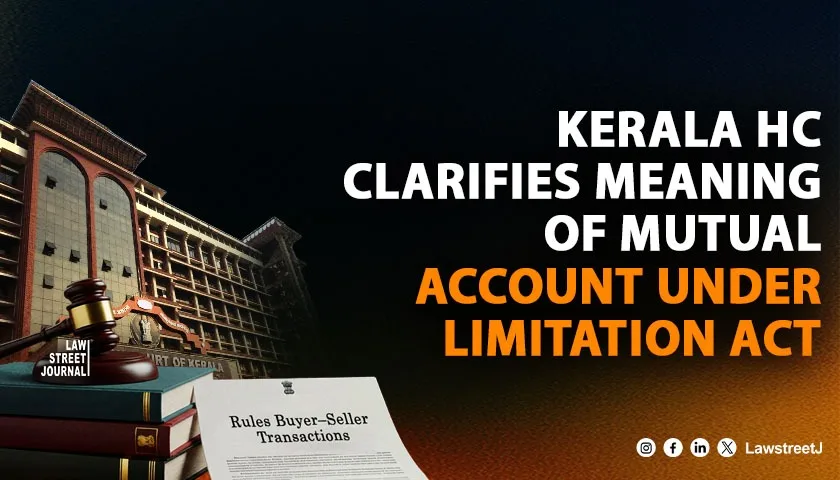Kerala: The Kerala High Court has ruled that a simple buyer–seller transaction, where payments are made merely to discharge debt, does not constitute a mutual, open and current account under Article 1 of the Limitation Act, as there is no reciprocity of independent obligations creating mutual debts between the parties.
A Division Bench comprising Justice Sathish Ninan and Justice P. Krishna Kumar examined what constitutes a mutual, open and current account for limitation purposes, emphasizing that procedural law must serve justice rather than obstruct it.
The bench heard Regular First Appeals Nos. 198 and 375 of 2012 arising from a money suit filed by Tata Iron & Steel Co. Ltd. against Pattasseril Cement Marketing, a partnership firm, and its partners, claiming ₹80,74,224, including a principal amount of ₹47,29,420.99 and interest for unpaid goods supplied on credit.
The plaintiff company manufactured and sold iron and steel, while the first defendant partnership firm was its authorised dealer. According to the plaintiff, the defendants purchased goods on credit while maintaining an open, mutual and current account, with payment defaults since 1997. The last payment of ₹52,250 was made on 19.02.1998.
The trial court upheld the principal amount but declined interest as no agreement for interest payment was proved. Crucially, the trial court held that the suit fell within Article 1 of the Limitation Act governing mutual, open and current accounts.
The defendants challenged this on multiple grounds:
- the transaction was not a mutual, open and current account attracting Article 1;
- the plaint was barred by limitation;
- the plaintiff failed to prove the claim; and
- the second defendant was not a partner liable for the debt.
Justice Sathish Ninan, writing for the bench, first addressed whether Article 1 applied. The court noted that Article 1 provides a three-year limitation period for the balance due on a mutual, open and current account with reciprocal demands, computed from the close of the year in which the last admitted or proved item is entered.
The bench held: “To be an open, mutual and current account, there must be mutual dealings between the parties creating mutual debts or reciprocal demands. There should be two sets of independent transactions between the parties; the creditor in one will be the debtor in the other.”
Relying on the Supreme Court decision in Hindustan Forest Company v. Lal Chand, the court explained: “A transaction between a buyer and seller, wherein the buyer pays the price for the goods sold by the seller, is only a payment in discharge of the obligations under the contract. It does not create independent obligations on the parties.”
The bench cited Tea Financing Syndicate Ltd. v. Chandrakamal Bezbaruah from the Calcutta High Court: “The requirement of reciprocal demands involves transactions on each side creating independent obligations on the other, and not merely transactions which create obligations on one side, those on the other being merely complete or partial discharges of such obligations.”
The court further referenced Komu Haji Hysrose Haji v. Moosakutty Bava, where it was held that: “It is only when parties agree to bring together their items of debits and credits relating to their mutual dealings for a set-off against each other, that a mutual account comes into existence.”
Justice Ninan concluded: “In the present case, there is only a contract for sale of goods and payment for them. The payments made by the defendants go in reduction of their debt to the plaintiff. Hence, the appellants are right in contending that the suit is not based on a mutual, open and current account falling under Article 1 of the Limitation Act.”
With Article 1 ruled out, the bench examined limitation under Article 14 (suits for the price of goods sold and delivered – three years from the date of delivery). Since the plaint claim related to transactions from 1997 onwards and the suit was filed on 31.01.2000, it fell within limitation.
Additionally, the court found acknowledgment of debt. The plaintiff’s demand letter dated 28.01.1999 was replied to by the defendants on 12.02.1999, where no dispute was raised regarding the debt, time was sought for settlement, and collateral security was agreed to be provided. This, the court held, constituted sufficient acknowledgment.
On proof of accounts, defendants argued that Order VII Rule 17 CPC required production of account books with the plaint, and since Rule 18 (which allowed later production) was deleted by the 2002 Amendment, the account books could not be relied upon. The bench rejected this, noting that the power was shifted to Order VII Rule 14(3). More importantly, the court reiterated: “Procedure is a handmaid of justice and not its mistress.” Citing State of Punjab v. Shamlal Murari, it stressed that procedural law must aid justice.
The list of documents annexed to the plaint indicated that photostat copies of the ledgers were produced with originals to follow. The originals were subsequently produced and marked without objection. The court held: “The admissibility of the documents cannot be challenged at this stage.”
PW1 (Accounts Manager) and PW2 (Finance Manager) testified, and Exts. A1 to A133 invoices corroborated the ledger entries. Importantly, the defendants’ reply dated 12.02.1999 to the demand letter neither disputed the correctness of accounts nor the outstanding balance but sought time and agreed to provide collateral security.
The court held: “In these circumstances, the trial court was justified in holding that ₹47,29,420.99 is due to the plaintiff.”
On the second defendant’s liability as partner, the bench found no evidence establishing partnership. Communications relied on by the plaintiff did not prove partnership status.
Accordingly, the decree was modified: RFA No. 198/2012 was allowed, setting aside the decree against the second defendant. RFA No. 375/2012 was partly allowed, reducing interest from 12% to 9% per annum from the date of suit until decree and 6% thereafter, while affirming the decree against defendants 1, 3 and 4.
Case Title: Jimmy Elias v. The Tata Iron & Steel Co. Ltd. and Others




![Kerala HC Quashes 498A Dowry Harassment Case Against Live-In Partner, Citing Lack of Relative Status [Read Order]](/secure/uploads/2023/08/lj_5693_1057c042-1e57-4e27-8c9e-25af0ec38ec4.jpg)
![Watching porn on mobile: Kerala HC highlights importance of mother cooked meals, outdoor sports [Read Order]](/secure/uploads/2023/09/lj_9155_Parental_supervision_of_mobile_phone_usage.jpg)
![Lakshadweep MP Mohammed Faizal Disqualified from Lok Sabha After Conviction Suspension Plea Rejected by Kerala High Court [Read Notice]](/secure/uploads/2023/10/lj_9640_87b5fd97-0e05-4ff8-9a99-3be1e4446192.jpg)






